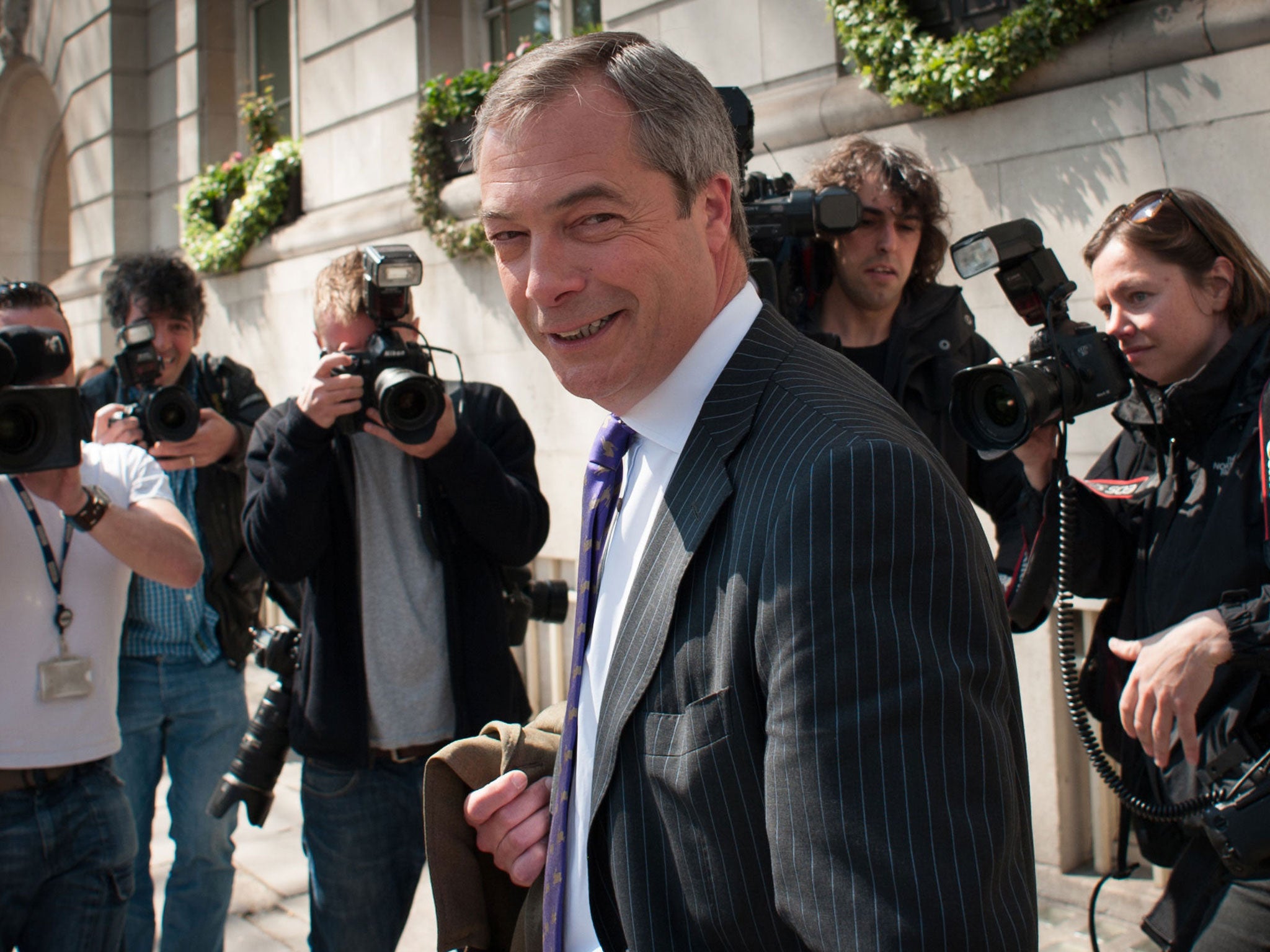Local elections: Tories in civil war as Ukip glory puts David Cameron under pressure

David Cameron was under conflicting pressures from the Conservative right and left last night after the UK Independence Party sent shockwaves through the political system by winning a quarter of the votes in the council elections.
The Prime Minister was urged to toughen the Tories’ stance on immigration, Europe and welfare to head off a Ukip advance that could deny his party victory at the 2015 general election. But Tory modernisers warned that such a move would alienate centre ground voters by risking the return of its “nasty party” image.
Ukip was the undisputed winner in Thursday’s elections in 35 local authorities in England and Wales. Nigel Farage, its leader, claimed a “sea change in British politics” after it dramatically gained 139 seats. The Tories were hit the hardest, losing control of 10 authorities and making a net loss of 330 councillors. The Liberal Democrats lost more than 120 seats. Labour made 291 gains but was overshadowed by the Ukip advance.
A BBC projection of the national share of the vote put Labour on 29 per cent; the Conservatives on 25 per cent, equalling their lowest in a local election; Ukip on 23 per cent; the Lib Dems on 14 per cent, their worst showing in council elections and other parties on nine per cent. It is the first time no party has won more than a 30 per cent share, reflecting the voters’ disenchantment with the mainstream parties which Ukip has now exploited.
Ukip came a strong second in the South Shields parliamentary by-election caused by the resignation of David Miliband, winning 24 per cent of the vote as Labour retained its safe seat. The Lib Dems came a humiliating seventh and lost their deposit.
A jubilant Mr Farage said: “We have been abused by everybody, the entire establishment, and now they are shocked and stunned that we are getting over 25 per cent of the vote everywhere we stand across the country.”
Mr Cameron, who once dismissed Ukip as “loonies, fruitcakes and closet racists,” softened his language. “It is no good insulting a political party that people have chosen to vote for. We need to show respect for people who have taken the choice to support this party and we are going to work really hard to win them back,” he said. “More to help with the cost of living, more to turn the economy round, more to get immigration down, to sort out the welfare system. They will be our focus, they are our focus, but we have got to do more.”
Tory Eurosceptics demanded immediate legislation to “lock in” the party to holding an in/out referendum on the EU after the 2015 election, as Mr Cameron has promised. John Baron, a Tory MP, said the party leadership must learn from its “errors” in handling the Ukip threat. “Our commitment to an EU referendum needs to be believable,” he said.
John Redwood, the former Cabinet minister, said the results showed that voters, like Conservative MPs, “want faster progress on the new relationship with the EU”.
But Bright Blue, a group which back Mr Cameron’s modernising project, warned him not to listen to the Tory right. Ryan Shorthouse, its director, said: “Conservatives should not panic and react by trying to be more hardline than UKIP on welfare, Europe and immigration. Instead, we should convince voters we are the only party with enough experience, gravitas and compassion to be really trusted - with the difficult and complex job of government, to sort out the public finances, and with supporting the vulnerable and those struggling in these challenging economic times”.
Labour insisted it was “on course for victory” in 2015 after winning council seats in its target constituencies, but analysts said its performance fell short of that. Ed Miliband hailed “good gains” but admitted there was “more work to do”. He said: “These elections show many people have lost trust in David Cameron’s ability to change Britain. But our task is to win the trust of the people we haven’t yet persuaded that Labour can make the difference.”
Nick Clegg, the Lib Dem leader, said: “It is understandable why it is that people might be attracted to the simple answers that the UK Independence Party is offering to deal with this country’s complex problems. But I do not think they do have the answers to the dilemmas we face as a country. I believe that the Liberal Democrats do.”
Lib Dem officials said the party had done well in the areas where it has MPs. But grassroots activists warned that could make it a “two-tier party” and said MPs needed to “motivate and inspire” the whole party. Gareth Epps, co-chair of the Social Liberal Forum, said: “Each step forward is matched by a step back, and then there’s South Shields. The need to set out a clear Lib Dem stall, most of all on the economy, is now urgent.”
Join our commenting forum
Join thought-provoking conversations, follow other Independent readers and see their replies
Comments